
How to live our best self — and life — in a virtual world by tapping into the power of OFF
—
Eight years ago, as a Facebook newbie, I read a post in which my good friend announced that she had gotten up for an early bike ride and was now following the ride with a refreshing acai juice. The experience of reading her short post left me feeling bewildered and disturbed. It was inexplicable to me why a mature, intelligent adult would want to post such information to a public audience. I didn’t get it at any level, but I knew at that moment that life as I knew it was about to change in a radical, profound and as of yet, unknowable manner. I knew that we were all headed into an unfathomably new world.
As someone who writes a lot about the internet and social media, I am frequently asked if I think the young people of today will grow up to become future addicts, as a result of their use of technology. I answer the question by explaining that our young people are not going to grow up to become addicts — they already are addicts, as are we, the adults who are raising them.
In case you have any doubt: a child born in 2013 will have spent an entire year of his life in front of a screen by the time he is age 7.
Half of millennials would rather give up their sense of smell than their phone. Forty-six percent of smartphone users say their phone is something they couldn’t live without. Ninety percent of 18-29 year-olds now sleep with their phone.
What’s different and more troublesome about this particular addiction is that in the past, addictions fell outside the norm. If you were drinking or eating too much, taking drugs or engaging in some other aberrant behavior, it made you an outsider, and eventually to some degree, left you excluded from society. With technology however, we are all drinking the Kool-Aid, all engaging in a globally condoned addiction. Wearing diapers at the videogame club so as not to have to interrupt play with the bother of bodily functions is now considered reasonable behavior. Being addicted to our devices, if anything, makes us part of the club, an insider. Recovering from an addiction means first recognizing that we are addicted — and in a world of addicts, it’s less possible or likely that our use of technology will be recognized as something in need of attention.
As is true with all addictions, our use of technology is changing the way we relate to life. In my psychotherapy practice, I have noticed a significant change in the way young people respond to certain questions. It used to be that when I asked people in their twenties and thirties what they wanted for their life, they would mention the things they wanted to do: play music, travel, write, work as a doctor, fall in love etc. They talked about the experiences they wanted to have. Now when I ask young people what they see for their lives they mention things like build a brand empire, live a certain lifestyle or simply, be famous. But famous for what seems increasingly irrelevant. Thank you social media!
It used to be that our image or perceived identity was an organic outgrowth of who we were; we went to the museum because we were interested in art. We were known as an artist because we enjoyed the work. In the digital age, the cart has replaced the horse. We craft an identity first, a ‘me’ brand, and then use pieces of life to build it and fill it in. We go to the museum, not to look at art but rather to take selfies of ourselves looking at art, which can then be posted to demonstrate that we are the kind of person who enjoys art and goes to museums, and, be recognized as such. The important part is the identity the experience promotes, not the experience itself.
Life is an object we make use of in the marketing campaign that is ‘me’. Experiences are opportunities to build our brand.
In addition, with the help of technology, we are relating to life as something to be captured and possessed. We go to our child’s dance recital but spend the performance trying to get the experience into our device. We miss out on the direct experience of life in exchange for getting to have the images of life in our smartphone. As a result, we end up with a lot of technology, 64 GB of memory, but no bodily-felt memories, no experience of having actually lived, nothing that becomes part of us on a cellular level. Our phone serves as proof that we have a life, but as payment for that proof, we give up our own presence in life as it is happening. In essence, we have chosen to possess life in exchange for experiencing it.
And yet, despite life’s usefulness as an identity-building tool, we have come to view our lives as lacking and never enough. Our Instagram feed provides unceasing examples of lives being better lived, more enjoyed. Our life can only fail to compete, no matter how richly we pack it with proof of our importance, happiness and success. Our expectations of life, now fueled by technology, are that it should always be entertaining, satisfying, exciting, interesting, expanding and serving us. Life should give us what we want, without pause. And when life isn’t all it’s supposed to be, we’re left feeling deprived, missing out, and also to blame, for not being able to make life what it should be and clearly is for everyone else.
Technology is remarkable in how much it allows us to do. These days, if you can think it, there’s probably an app to be able to do it. As our ability to do multiplies, so too does our belief that we must take advantage of all the new things we can do and if we’re not then again, we’re missing out on something great. What we’ve stopped asking ourselves or even contemplating however, is whether we want to to do all the things that are now possible. Because we can do something does not mean that doing it will add something positive to our lives.
And, when it comes to technology, many of the things that we now spend our lives doing, merely because we can, end up draining us of energy and time without providing any real satisfaction or nourishment.
Technology on its own is not causing us to behave in the ways we are behaving. Technology is, however, making it far easier and more acceptable to feed our less evolved proclivities and to distract us from feeling our emotions. Inherent in each one of us is a reptilian nature with a strong drive towards pleasure, instant gratification and whatever’s easiest. This part of us, if allowed, will gladly surrender responsibility and disappear into distraction, entertainment and self-involvement.
At this time in history, we are bingeing on technology as if we were at a cruise ship buffet, allowing ourselves to ingest without limits, to the point of sickness — because we can and no one is stopping us. Unfortunately, this less evolved self, for whom technology is the perfect partner and tool, does not have the wisdom, maturity, patience or power of discernment to lead us to a state of wellbeing, which is ultimately where we want to be headed.
Technology is not going to control itself or encourage us to be discriminating. It’s up to us humans now to start consulting our mature and wise selves, contemplating what we really want and need to live a nourishing and satisfying life, what really matters in a good life. We, as the users of technology, the ones actually in control, must start making conscious choices about how we want to be in relationship with our technology. Freedom from technology is no longer an option, but freedom in technology is ours to create.
Ask yourself:
Is technology improving my sense of wellbeing?
Is it making my life more fulfilling or gratifying?
Is it improving the parts of my life that really matter to me?
Is technology making me feel more connected, deepening my relationships?
Is it enriching my experience of life?
If your answer to any of these is no, then, what do I need to change, stop or add in order to bring my life back into alignment with what really matters?
The not-so-good news is that, thus far, we have been building bad habits with technology and allowing ourselves to be dazzled into a state of entertained unconsciousness. The good, even great news is that going forward, how we will be in relationship with technology, each other, ourselves and life itself, is up to us. We can wake up, recognize what’s true for ourselves, and reclaim our lives back from our devices. It starts here, now, with you, me, and each one of us, making that choice for ourselves.
You may also enjoy reading Forest Bathing: How Immersing in Nature Can Help You Reconnect by Tess DiNapoli
